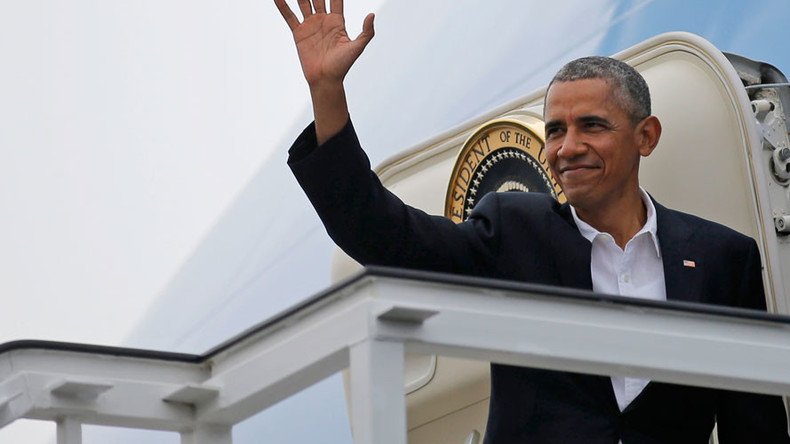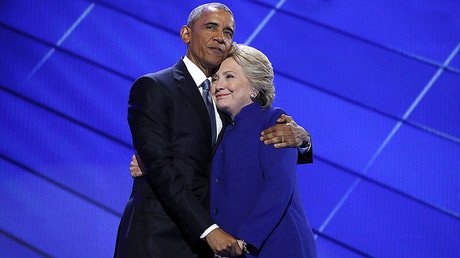Three reasons for Obama’s new Russia sanctions that have nothing to do with ‘hacking’

There are a few reasons Washington has imposed new political sanctions on Russia this week — including the expulsion of 35 diplomats — and none of the reasons have anything to do with Russia “hacking” the American election.
So, let’s go through them. There are three primary motivators for Barack Obama here.
#Obama says US expelling 35 Russian ‘intelligence operatives,’ closing 2 compounds https://t.co/QDGRPZNEOt
— RT (@RT_com) December 29, 2016
Reason 1: Part of a face-saving exercise for Hillary Clinton and the Democratic Party
Barack Obama’s party has been kicking up such an unholy fuss over Russian “hacking” for months. The Democrats fully intended to blame the Russians if the election went Donald Trump’s way — and as expected, since November 9, they have been gung ho about Putin stealing the election from Hillary Clinton. Clinton voters, many of them, fully believe groups of hooded Kremlin-backed hackers in Vladivostok stole their election. They believe this with such ferocity because it is what they were told to believe by their party, by their country’s intelligence agencies, and by the media. The hurt feelings after losing the election could only be alleviated by directing the blame toward outside forces that had nothing to do with their candidate or their campaign.
How would it look if Obama now came along and said, “We don’t have the evidence for it, so let’s all pack up and move on with our lives?” Not a chance. How would it look if he admitted that there’s stronger testimony pointing toward these “hacks” actually being an insider leak? Having spent months sharpening the swords against Russia, that would be mortifying.
Reason 2: Last-ditch attempt to sour relations between Trump and Russia
It’s too early to tell what the Trump effect on US-Russia relations will be, but the current administration is doing everything in its power to ensure it won’t be entirely restorative. That’s rather sad, because after an eight-year-long plummet into a new and dangerous Cold War, surely improving the relationship should be a top priority. Instead, the Obama administration seems intent on trying to convince Trump that the Russians really are the baddies for all seasons and that only the most aggressive approach will work when dealing with the Kremlin.
Obama has just a few more weeks to force Trump to “admit” that Russia interfered with the election, thus forcing him to begin his term on a more sour note with Russia. Of course, given that he won, Trump is hardly going to jump enthusiastically aboard that bandwagon and start tweeting about how Putin stole the election — but he is in a bit of a bind. Although he won’t suddenly begin attributing his victory to Russian hackers, he will not want to be seen to be ignoring the leaders of the US intelligence community. As such, he has agreed to meet intelligence officials next week to be “updated on the facts” of the situation.
Reason 3: An immature revenge over Syria
It surely can’t be a coincidence that these sanctions were communicated on the day a new ceasefire was announced in Syria; a ceasefire organized by Russia, Iran and Turkey, with the US playing no part. A bitter pill to swallow, indeed.
The fact the US was left out of these latest ceasefire negotiations will be yet another reminder to the Obama administration of where they failed on the global stage. A US presence at the negotiating table was irrelevant because three weeks from now Trump is expected to take a vastly different approach to Syria.
A year ago, after Turkey shot down a Russian jet over Syria, Russia-Turkey relations were dead in the water, seemingly never to be revived. If Moscow and Ankara can get from there to here, surely the US can think up better ‘solutions’ to their problems than kicking a few dozen diplomats out of New York and Maryland.
The Kremlin called the latest sanctions “unpredictable and even aggressive” in their response. One could easily disagree with that. The ‘agree with us or hit the road’ approach is standard and entirely predictable in US foreign policy. When you consider that forcibly removing foreign leaders from power is eternally more preferable than talking, throwing out diplomats over possibly fake hacking doesn’t seem so surprising.
Russian President Vladimir Putin has confirmed agreement has been reached on ceasefire in Syria
— RT (@RT_com) December 29, 2016
DETAILS: https://t.co/Fp19kHrDwZpic.twitter.com/vMmFmW1k2Y
Dangerous precedent on scant evidence
Imposing sanctions over unproven cyber attacks sets a dodgy precedent. It essentially means the CIA can continue to conjure up any wild claims it likes, and no one — not even the media — will question them. The White House can then go ahead and impose whatever kind of political sanctions it likes on its enemies as “retaliation” without having their hands tied by little things like evidence or the facts. That is dangerous.
Just look at how the next set of European elections are already being framed by Western media. Not only did Putin engineer Brexit in the UK and Trump’s election in the US — along with a few other less consequential European votes — but he apparently also has the French and German electorates firmly in his pocket, too. Who is to say that the CIA and their friends in Europe won’t come up with more tales of Russian interference if those elections don’t go their way either? We’re already being primed for it.
Last but certainly not least, it would be remiss to end without noting the sheer hypocrisy of the country best known for engineering coups and interfering in foreign elections having the audacity to throw a hissy fit at this level over the mere notion that someone could deliver a taste of their own medicine.
The statements, views and opinions expressed in this column are solely those of the author and do not necessarily represent those of RT.















